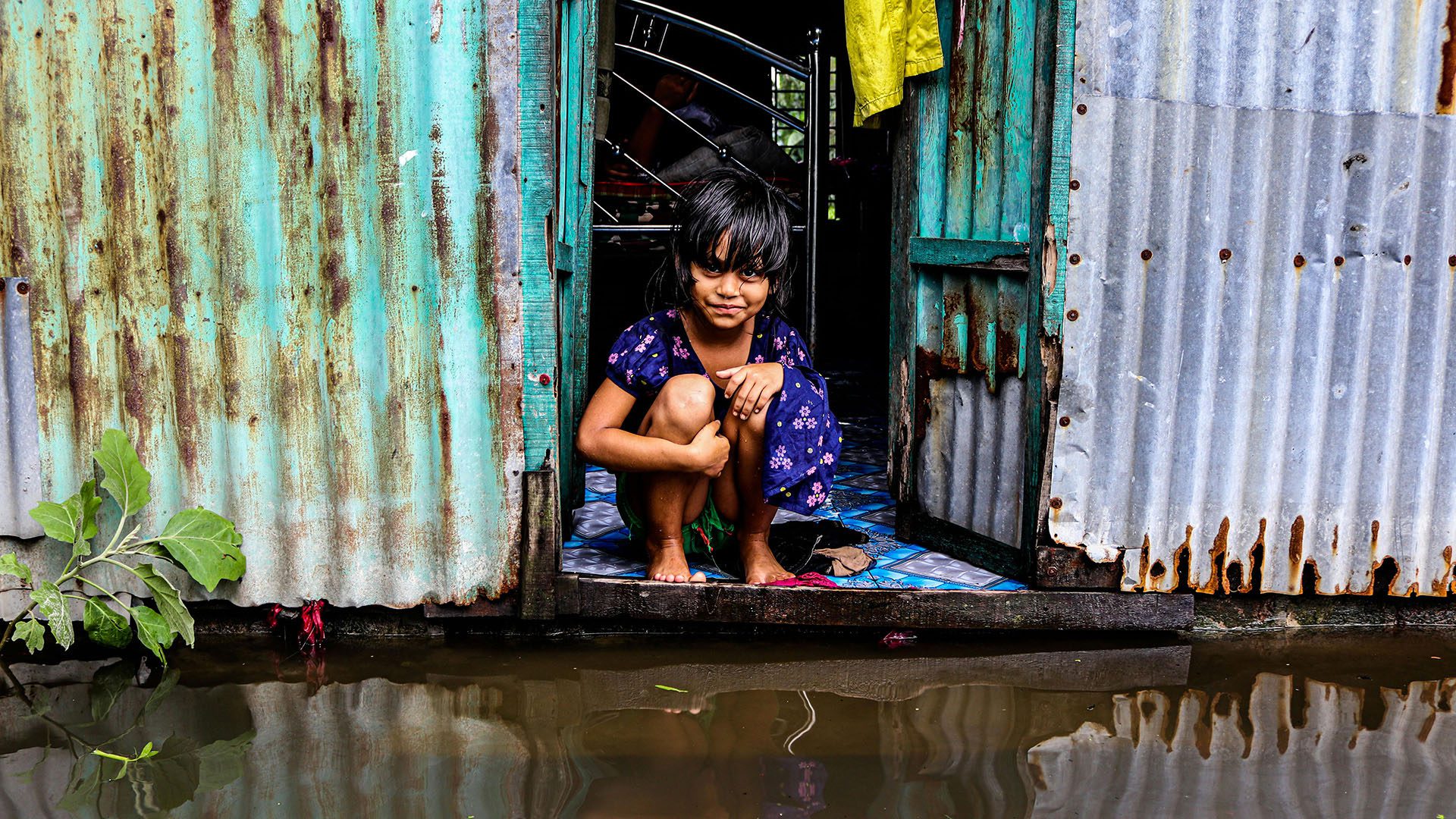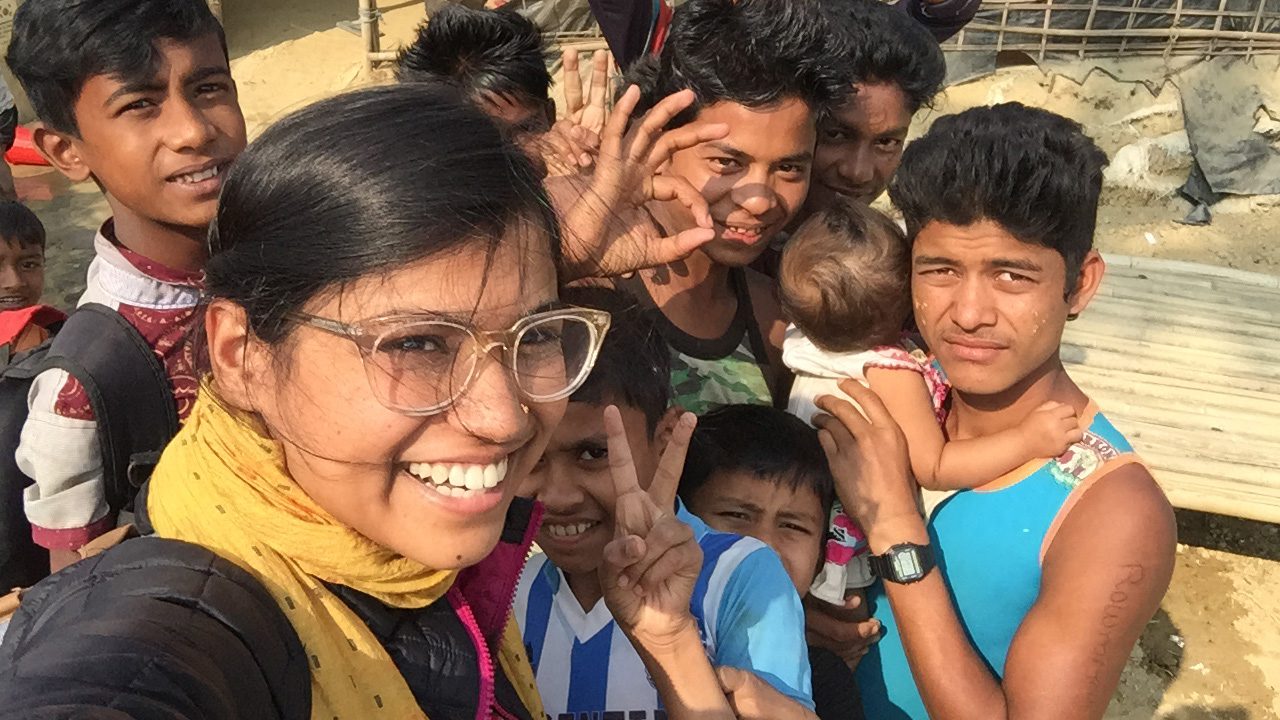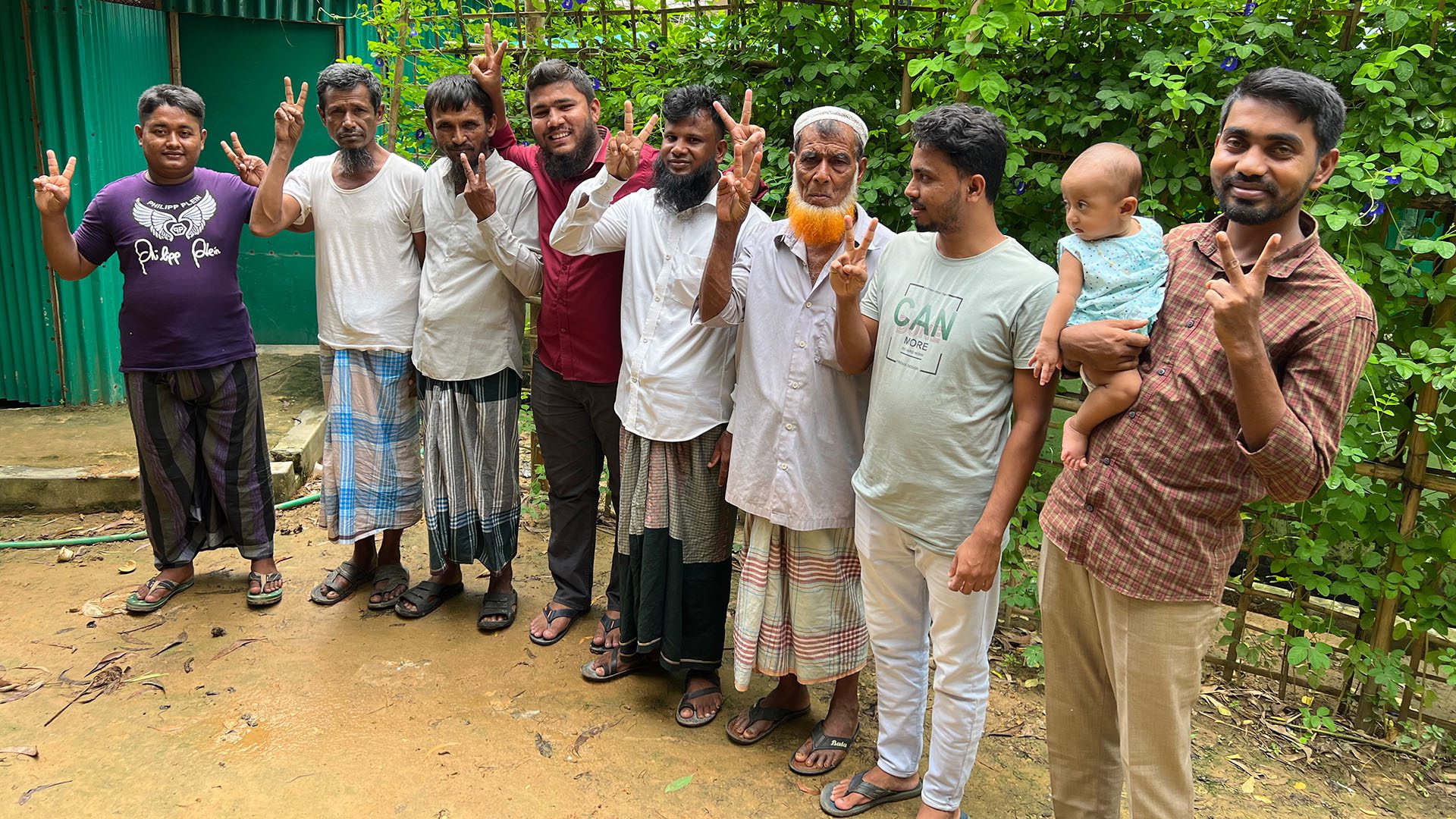Dr. Fatima Zahra, a Mittal Institute Associate, spearheads research at the intersection of human development, labor markets, and artificial intelligence with a focus on the future of learning and work. Several of her projects look at Bangladesh, where she is originally from, including her studies on how climate change impacts child development and what employment barriers Rohingya fathers face in refugee camps.
Fatima Zahra is an Assistant Professor of Evaluation, Statistics, and Methodology in the Department of Educational Policy and Leadership Studies at the University of Tennessee, Knoxville. She holds a Ph.D. in Interdisciplinary Studies in Human Development from the University of Pennsylvania and completed postdoctoral training at Harvard Business School and Harvard T. H. School of Public Health.
The Mittal Institute spoke with her about her motivation and approach to study climate change in Bangladesh and how socioeconomic and political factors are essential to understanding its impacts.

Fatima Zahra
Mittal Institute: What motivated you to study the impact of climate change on humans, especially child development in vulnerable regions?
Fatima Zahra: Climate change is not a distant issue; it is a pressing force reshaping lives worldwide, from health to cognitive development. My journey into this field began with my dissertation on sustainable farming in rural Bangladesh, where I saw how environmental knowledge and technology skills empower communities to build resilience—a theme that continues to guide my work.
Inspired by groundbreaking studies led by Drs. Emily Hannum, Jere Behrman, and Fan Wang at the Population Studies Center at the University of Pennsylvania, I turned my focus to how rising temperatures, pollution, and climate-related disasters impact children’s academic and developmental outcomes, particularly in marginalized communities. This led me to found the Artificial Intelligence, Race, and Evaluation Lab (AIRELab) in 2023, where my students and I work together to study the future of learning and the labor market. In one of our studies, we examine the effects of climate change on learning, using large datasets like the Programme for International Student Assessment (PISA) and World Bank Climate Change data. We analyze the influence of rising temperatures on students’ math performance and predict the future of math performance in the context of rising temperature with global policy implications.
“I turned my focus to how rising temperatures, pollution, and climate-related disasters impact children’s academic and developmental outcomes, particularly in marginalized communities.”
Locally, we collaborate with young Rohingya fathers in Bangladeshi refugee camps to explore ways to support their children’s early development amid challenging environmental and economic conditions. By focusing on both learning and livelihood opportunities, we aim to help these fathers create a stable home environment for their children’s growth. My early work with the Rohingya population dates back to 2019, when I was a postdoctoral researcher at Harvard Business School and the Harvard T.H. Chan School of Public Health.
My greatest motivation is to train the next generation of scholars and practitioners equipped to tackle these challenges head-on, with climate change at the heart of every research question, especially those related to equity. We examine how climate change, alongside the rise of artificial intelligence (AI) and automation, deepens educational and developmental disparities, disproportionately affecting marginalized communities. By framing our work through this lens, we aim to generate insights that inspire equitable solutions, ensuring our research contributes to a more just and climate-resilient future.

Dr. Fatima Zahra explores the impact of climate change on child development in India. Photo from Narayanganj, Dhaka Division, Bangladesh (Pexels).
Mittal Institute: How do you define “vulnerable regions” in the context of your research?
Fatima Zahra: In my research, “vulnerable regions” are areas where people face limited access to essential services such as clean water, food, healthcare, education, and employment, and where fundamental human rights are not fully realized. In South Asia, particularly in Bangladesh, these vulnerabilities are intensified by economic instability, environmental degradation, the digital and AI divide, and a growing forcibly displaced population. This digital and AI divide restricts access to technology and information, further marginalizing communities from opportunities that could support resilience and development.
Mittal Institute: What methods or tools are you using to assess the impact of climate change on developmental outcomes of children?
Fatima Zahra: Our approach to assessing the impact of climate change on children’s development is data-driven, cross-disciplinary, and fundamentally rooted in cultural responsiveness. By integrating big data with insights from local communities, we gain a richer understanding of complex relationships, such as the effects of environmental stressors on cognitive development, which can vary widely across cultural and socioeconomic contexts. Leveraging large datasets like PISA scores and environmental metrics, we identify global patterns and apply methods such as linear mixed models and predictive modeling to capture cross-country variability and trends over time.
“By integrating big data with insights from local communities, we gain a richer understanding of complex relationships, such as the effects of environmental stressors on cognitive development, which can vary widely across cultural and socioeconomic contexts.”
In our “Future of Learning and Labor Market Project,” we focus on climate-vulnerable regions like Bangladesh, where we explore how environmental stressors—rising temperatures, declining air quality—interact with broader socio-economic challenges and technological shifts, including AI and automation. This work, conducted in collaboration with local ministries and industry leaders, employs culturally responsive methods that acknowledge the unique socioeconomic and environmental contexts of these regions. Our findings not only reveal macro-level trends but also address specific needs and aspirations of the communities involved, ensuring that our insights are globally relevant while locally actionable. This multicultural, cross-disciplinary approach allows us to design equitable solutions that respect and incorporate local knowledge, offering practical support for both policymakers and communities on the front lines of climate change.

Dr. Fatima Zahra in a Rohingya refugee camp in Bangladesh in 2019.
Mittal Institute: Can you share early findings of how poor air quality, natural disasters, and rise in temperatures affect children’s development?
Fatima Zahra: Our research uncovers a troubling link between environmental stressors and children’s cognitive performance, particularly in mathematics. Rising temperatures correlate with lower math scores globally, with hotter countries often reporting poorer performance. This finding is consistent with longstanding psychological theories suggesting that excessive stress—like that caused by heat—can impair cognitive functioning.
But temperature is not the only factor. Poor air quality, frequent natural disasters, and high population density each add cognitive strain on young minds. These environmental pressures do not act alone; instead, they combine and intensify, creating a particularly severe impact on cognitive development in climate-vulnerable regions. By using advanced statistical models, we capture these cumulative effects across countries and time, revealing a complex picture that signals a need for targeted, climate-conscious policy interventions.
“Environmental pressures do not act alone; instead, they combine and intensify, creating a particularly severe impact on cognitive development in climate-vulnerable regions.”
Interestingly, while high population density is generally seen as a stressor, it showed a slight positive association with math performance, potentially due to better access to educational resources in urban areas. However, this advantage is not enough to counterbalance the negative impacts of rising temperatures and poor air quality.
Mittal Institute: Do you also consider socioeconomic and political factors in examining climate impacts on child development in these regions?
Fatima Zahra: Absolutely. We see socioeconomic and political factors as essential to understanding how climate impacts child development. Climate change does not exist in a vacuum; it is deeply intertwined with economic and political instability, especially in already vulnerable regions. In the research I mentioned earlier, we analyze how factors like income, health spending, and population density influence cognitive outcomes in the face of environmental challenges.
On a more local level, our work (Co-PIs: Jere Behrman and Ngalula Fleurant) with Rohingya fathers in refugee camps highlights how environmental pressures—such as frequent floods, overcrowding, and poor air quality—affect children’s health and development. These issues are compounded by the political displacement and economic uncertainty that families face daily. For many of them, the primary concern is how this combination of environmental and social instability will shape their children’s futures.
Our approach is both culturally responsive and climate-sensitive, crafted to address this intricate web of influences. By integrating environmental, economic, and social dimensions, we aim to craft solutions that do not just add to the data—they make a difference where it matters most.

Dr. Fatima Zahra collaborates with young Rohingya fathers in Bangladeshi refugee camps to explore ways to support their children’s early development amid challenging environmental and economic conditions. Photo taken by Fatima Zahra.
Fatima Zahra: The impacts of climate change are incredibly context-specific, and we see stark differences between regions. Bangladesh, for example, is uniquely vulnerable due to its low-lying geography, dense population, and frequent natural disasters. These factors compound economic and developmental challenges in ways that differ greatly from what we observe in other countries. By contrast, the U.S., though certainly impacted by climate shocks, generally has more resilient infrastructure, offering some buffer—though long-term climate risks remain significant there.
Our approach always begins with a deep understanding of these regional differences. Whether we are working on AI-assisted educational initiatives or designing climate-resilient employment models, we tailor our solutions to the specific socioeconomic, cultural, and geopolitical realities of each area. We are also looking to expand this work into India soon. This nuanced understanding is essential for developing equitable interventions that address local needs, while also contributing to broader theories of educational and developmental resilience.
Mittal Institute: What policy recommendations or interventions does your research suggest to mitigate the negative impacts of climate change on child development in Bangladesh/South Asia?
Fatima Zahra: Our research underscores the urgent need for policies that address not only the immediate effects of climate change on child and human development but also the future challenges that AI and automation bring to the labor market. Through our “Future of Learning and Labor Market” project in Bangladesh, we examine how climate stressors and technological shifts disproportionately impact marginalized communities, where educational resilience is crucial for sustainable growth.
“Our research underscores the urgent need for policies that address not only the immediate effects of climate change on child and human development but also the future challenges that AI and automation bring to the labor market.”
Our policy recommendations advocate a multi-sector approach—one that prepares students for both climate-resilient industries and the digital age. This means integrating digital/AI literacies, critical thinking, and problem-solving skills into the curriculum to equip children to adapt to climate-related disruptions and thrive in a labor market reshaped by automation. Preparing students for fields like renewable energy and sustainable agriculture is a critical step toward building a workforce that can adapt to and thrive in a changing climate.
At AIRELab, we are committed to developing interventions, designing people-centered evaluations, and training local researchers who can bridge these skill gaps effectively. By collaborating directly with local ministries and educational institutions, we aim to design culturally responsive programs and evaluations that address community needs directly, enabling families to face today’s environmental challenges and navigate a future where climate and technology intersect in powerful new ways.
☆ The views represented herein are those of the interview subject and do not necessarily reflect the views of the Mittal Institute, its staff, or its Steering Committee.
